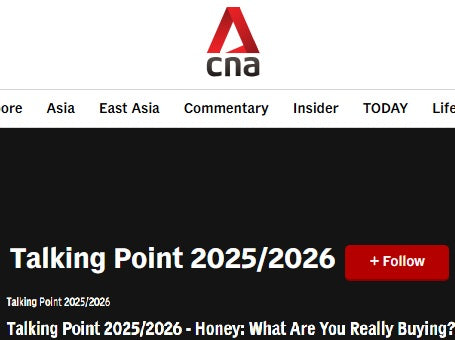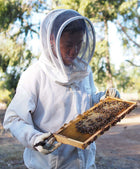Singapore’s Trustworthy Honey: Choosing a Pure Honey Brand

Why Fake Honey is a Real Problem
Even the prettiest jars on supermarket shelves might hide a sticky secret – many contain adulterated honey mixed with cheap sugar syrups. Honey is supposed to be a natural, healthy sweetener, but unfortunately it has become one of the world’s most adulterated foods. In fact, studies have found that up to 52% of honey samples from Asia were not pure honey – a troubling statistic for consumers. Adulteration often involves adding inexpensive corn or rice syrups to honey, or even feeding bees sugar water so they produce honey-like syrup. This means you could be paying for a jar that’s half honey, half plain sugar.
Why does this matter? For one, fake honey robs you of the very benefits that make real honey special. Pure honey is rich in natural enzymes, antioxidants, and antibacterial properties – these come from bees collecting nectar from flowers. Adulterated honey, by contrast, is essentially sugar syrup with none of those beneficial nutrients. In fact, adulterated honey has been found to contain antibiotics, toxins, or other harmful substances that could harm your health. Simply put, fake honey isn’t just a rip-off; it can undermine the health benefits of honey and possibly introduce risks that genuine honey wouldn’t have.
Singapore is not immune to this sticky issue. A recent investigation by Channel NewsAsia’s Talking Point programme highlighted that even honey sold in major Singapore retailers may not be as “pure” as the labels claim. The show’s host tested 18 bottles of honey from local supermarkets and uncovered that some “100% pure” honeys were adulterated with sugar syrup, even in premium-priced brands. One sample was found to be over 50% added sugar – a shocking revelation for consumers who thought they were buying the best. This expose has made many Singaporeans wonder: How can I be sure my honey is authentic?
How to Identify a Trustworthy Honey Brand
Not all honey on the market is equal, so it pays to be selective. Here are a few tips to ensure you’re getting authentic, trustworthy honey in Singapore:
-
Check the Source: Look for honey that clearly states its country of origin and producer. Trustworthy brands are transparent about where and how their honey is harvested. If a label is vague (e.g. just says “Packed in Singapore” or uses generic terms), be cautious. Single-origin honeys from reputable regions (Australia, New Zealand, etc.) are often safer bets than blended imports of unknown provenance.
-
Raw and Unprocessed: Raw honey means it hasn’t been overheated or finely filtered. This is a good sign, as it retains pollen, enzymes, and nutrients – indicators of real honey. Ultra-clear, super-smooth honey might look appealing, but it could have been processed to the point of losing natural qualities. Trustworthy honey may crystallise over time or vary slightly in colour with each harvest, and that’s actually a mark of authenticity.
-
Ethical Beekeeping Practices: Brands that practice bee-friendly, sustainable beekeeping tend to produce purer honey. For example, feeding bees with sugar syrup or over-harvesting honey (taking too much from the hive) can compromise quality. Ethical beekeepers let bees keep enough of their own honey and never dilute the process with sugar water. They also avoid pesticides and antibiotics, so nothing unwanted contaminates the honey. Support brands that prioritise bee welfare – it often means a better product for you too.
-
Lab Testing and Certifications: Some premium honey brands get their honey tested by independent labs for purity and quality. Look for any mention of laboratory test results, quality seals, or certifications. For instance, tests for Total Activity (TA) or pollen analysis can confirm a honey’s botanical source and antibacterial strength. A trusted honey brand will be proud to share its lab results or quality certifications as proof of authenticity.
-
Price and Credibility: While not all expensive honey is pure, extremely cheap honey should raise red flags. If a jar of honey is priced far below the normal market range, ask yourself how they managed to produce it so cheaply – it could be diluted with syrup. Buy from established retailers or directly from known beekeepers whenever possible. Reading reviews and doing a bit of research on the brand (How long have they been around? Do they explain their harvesting process?) can give clues about trustworthiness.
By following the above points, you can significantly improve your chances of getting real honey. But rather than having to play detective with every honey purchase, wouldn’t it be nice to have a go-to Singapore honey brand you know is genuinely pure? This is where Bee Bee Natural comes in.
Bee Bee Natural: Pure Honey You Can Trust
Bee Bee Natural’s beekeeper practices ethical harvesting in Western Australia, ensuring the honey is raw, unadulterated, and full of natural goodness. Bee Bee Natural has rapidly earned a reputation as Singapore’s most trustworthy honey brand – and for good reason. It was founded by a Singaporean beekeeper with a passion for authenticity, and the honey comes directly from his hives in the pristine forests of Western Australia. Unlike mass-market packers who might blend honey from various sources, Bee Bee Natural offers single-origin varietals (like Jarrah, Red Gum and other Western Australian honeys) that are harvested and bottled with care.
What makes Bee Bee Natural truly stand out in terms of purity and quality can be summed up in a few key points:
-
Raw & Unprocessed: Bee Bee Natural honey is never super-heated or ultra-filtered. It’s cold-pressed and unpasteurised, so all the natural enzymes, pollens and antioxidants remain intact – just as nature intended.
-
Ethical Beekeeping: The bees’ welfare comes first. The beekeeper go out his way to avoid feeding sugar syrup to the bees unless in extreme long winter dearth. Instead, the bees feast on wild nectar and keep plenty of their own honey for nourishment. This means the honey you get is derived purely from floral nectar, not diluted by artificial feeding. The hives are managed without pesticides or antibiotics, ensuring no chemical residues end up in your jar.
-
Single-Origin from Western Australia: Western Australia is renowned for its clean environment and unique floral sources. Bee Bee Natural’s honeys – like the coveted Bee Bee Natural’s Jarrah honey – come from specific forests and are not mixed with other honeys. Each batch has a distinct flavour and natural colour, reflecting the blossoms the bees visited. By sourcing from a single region and beekeeper, quality control is tight and traceable from hive to bottle.
-
Lab-Tested for Purity and Potency: Every batch of Bee Bee Natural honey undergoes laboratory testing to verify its purity and measure its natural antibacterial power (known as Total Activity). In fact, Bee Bee Natural’s Jarrah honey has tested at an exceptionally high TA level of 63+, classifying it as medicinal-grade honey with extraordinary antimicrobial strength. These test results give you peace of mind that what you’re eating is 100% honey with no hidden sugars – and packed with health benefits.
-
Transparent & Traceable: When you buy from Bee Bee Natural, you know exactly what you’re getting. The brand openly shares information about its harvesting methods, the beekeeper’s philosophy, and even the seasonal variations of the honey. This level of transparency is a hallmark of a trustworthy honey provider. It’s no surprise that Bee Bee Natural is often described as “Singapore’s best honey: a farmer’s very own harvest, lab-tested and direct from hive to table”.
In short, Bee Bee Natural checks all the boxes for authenticity and quality. It gives Singaporeans a convenient option to enjoy pure, unadulterated honey with full confidence. You’re not just buying honey; you’re getting a product nurtured by ethical practices and backed by scientific validation. Drop Chris a text on Whatsapp for a chat. 
Switch to Natural Sweetness – A Rewarding Choice
Aside from the rich flavour and unique medicinal properties of genuine honey, choosing a trustworthy honey brand like Bee Bee Natural lets you replace refined sugar with a healthier alternative. Many health-conscious individuals are swapping white sugar for honey in their tea, coffee, baking, and daily cooking. Why not make the switch? Pure honey has a lower Glycaemic Index than regular sugar, meaning it won’t spike blood sugar as rapidly. It also contains trace vitamins, minerals, and antioxidants that simply don’t exist in processed sugar. When you drizzle raw honey on your yoghurt or toast, you’re enjoying natural sweetness along with beneficial nutrients – truly a sweet reward for your body.
To help you make this positive change, Bee Bee Natural offers an easy way to keep a steady supply of authentic honey at home. You can subscribe to monthly honey deliveries through their Honey Gold Subscription programme – ensuring you never run out of quality honey. Subscribers enjoy big discounts on each jar as a reward for their commitment to a healthier sweetener. It’s a convenient, cost-effective way to say goodbye to artificial sugars and hello to all-natural goodness. Plus, with free islandwide delivery in Singapore, getting your honey is hassle-free.
Conclusion
In a market where not everything is as it seems, finding a Singapore trustworthy honey brand is invaluable. The evidence is clear: honey fraud is common, and even well-known labels might not be giving you the real deal. But by educating yourself and choosing brands that uphold strict purity standards, you can enjoy honey the way it’s meant to be – pure, safe, and beneficial.
Bee Bee Natural stands as a shining example of what a trustworthy honey brand should be. From ethical beekeeping practices and rigorous testing to the superb taste of its raw Western Australian honey, it offers Singaporeans a sweet experience they can truly trust. Why settle for questionable “honey” when you have a genuinely pure option available? Make the switch to authentic honey today, and savour the difference. Your taste buds – and your health – will thank you.
Sources:
-
Channel NewsAsia – Talking Point 2025/2026: Honey – What Are You Really Buying? (08 Jun 2025)channelnewsasia.com
-
Macquarie University & National Measurement Institute – Study on Global Honey Adulteration (2018): Almost 1 in 5 Australian honey samples were adulterated; 52% of Asian samples fakelighthouse.mq.edu.aulighthouse.mq.edu.au.
-
University of Arizona – Is Honey the Same as Sugar? (2013): Average GI of honey ~55 vs sugar ~68 (honey causes a smaller blood glucose spike)cales.arizona.edu.



